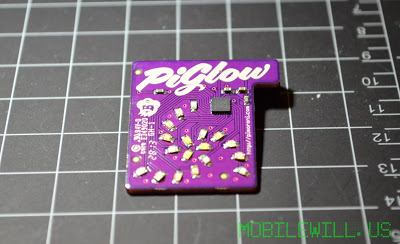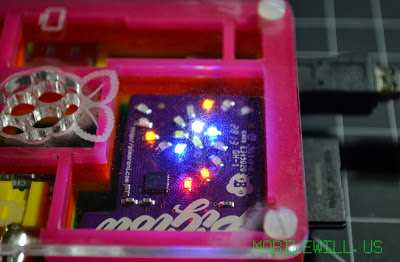In a recent Adafruit order I couldn’t resist picking up the new PiGlow for the Raspberry Pi. This is a neat 18 LED add-on that connects to the GPIO header of the Raspberry Pi and communicates over I2C. With the example Python code, I was blinking in color in no time.
You can buy them from Adafruit in the US or directly from Pimoroni in the UK. The Pimoroni site has all the links to get you started. I used the link to Jason Barnett’s Gihub which has a in depth how-to and a lot of examples to get you started and playing in color.
The LEDs are in a spiral pattern, making for a great binary clock, which is included in the code examples. I ended up taking it to work leaving the clock to run all day. Within the clock example you can set the LED brightness. All of the 18 LED brightness can be set from 0 to 255. I can tell you that 255 is super bright, I mean especially bright, as in put on your sunglasses. Especially the white LEDs in the center. Which just made me think of one cool project. With a PIR and light sensor you could make a hallway light, and even tweet when it is activated. That is how bright the white LEDs are.
All the LEDs are a single color. Starting from the center you have white, blue, green, yellow, orange, and red. Plenty to play around with. One great feature is that if you have their PiBow case, it fits with the case completely closed.
I think its a great addition to the Pi and there is so much you can do with it. The only thing I would like to see is maybe a version that doesn’t block all the GPIOs with maybe a stacking header. It only uses power and I2C but you lose access to the rest. You could use a breakout like Adafruit’s Cobbler or T-Cobbler and then connect the needed connections to the PiGlow.
This can be a great learning tool for someone new to the Raspberry Pi and Python. You can learn Python with instant feedback.



Comments 3
Hi,
I made a node.js module for the piglow: https://github.com/zaphod1984/node-piglow
It's super easy to use!
Awesome, I will check it out. Give me a chance to learn node.js!
Great, hope you like it 🙂